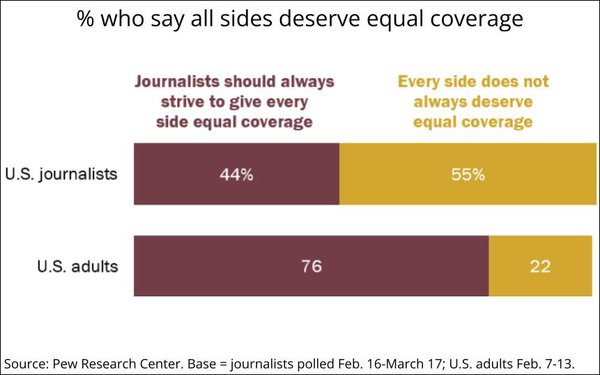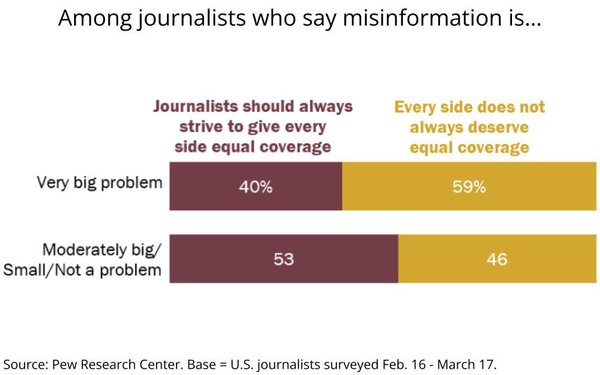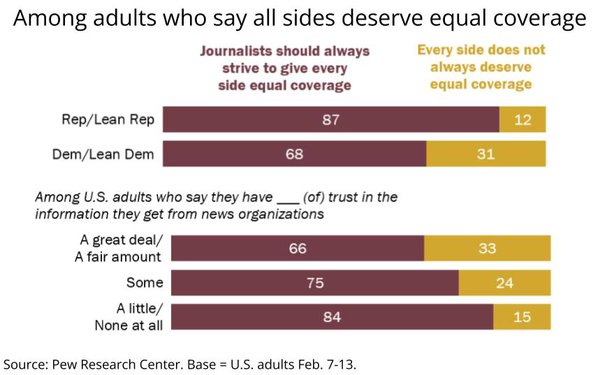Commentary
If You Believe 'Bothsidesism,' You Believe In An Oxymoron
- by Joe Mandese @mp_joemandese, July 13, 2022

When I was studying journalism in college in the late 1970s, it was when a philosophical shift was taking place about how to cover news. Instead of striving to be 100% "objective," the new school of journalism (sometimes called "New Journalism") was that every human being brings some subjective perspective to everything they do, and that it might be a good thing for journalists to put that filter on too.
I was fortunate enough to go on to work for one of the pioneers of New Journalism, legendary editor Clay Felker, when he was editing Adweek in the early 1980s, and he engrained the value of subjectivity in me, because it is one of the most valuable things someone can share with someone else.
Obviously, not all stories justify a journalist putting their own perspective into an article, but whether they try to or not, there is always going to be some measure of subjectivity, even if it's just deciding what to report and what parts to leave out.
advertisement
advertisement
I've always tried to do a good job of telegraphing my subjectivity to readers when I do that, but the past several years of coverage -- especially coverage of political media -- has caused me to question my own approach more than ever. That's probably because much of what I've been covering has been scientific research about how the subjectivity of news reporting influences how people perceive the reality of the world around them.
Among the sources of that research, has been the Pew Research Center, which today released a fascinating study showing the disconnect among journalists and average Americans. As well as among journalists of different ages, and American adults of different political or demographic leanings.
What it found overall is that journalists are much more prone to believe that not all sides deserve equal coverage in their reporting than do average American adults (see above).
One of the main reasons for this divide, write Pew's analysts, is that many journalists have grown cognizant of the role some sides play in spreading "misinformation." This is especially true among journalists who see misinformation as a "very big problem" (see below). Full disclosure, if you couldn't tell by now, I consider myself one of those.

The problem with my disclosure is that some people will think I'm politically biased, but I'm not. For more than 40 years, I have bent over backwards trying to report objectively on news representing different political points-of-view. And I think I've been more than even-handed about it.
The bias I do have is about covering misinformation, especially the kind that might be characterized as gaslighting, or trying to get people to question their very sense of reality.
I can name names, but you probably already know who I mean.
One of the problems is some of those sources of misinformation, also happen to be perceived as being heavily on one side of the political spectrum (guess which one), and if you look at the tracking by Ipsos, Reuters, Axios and others, it's not just an opinion, it's based on some scientifically objective facts.
Ipsos political expert Chris Jackson has done this several times over the past few years, utilizing objective facts such as COVD-19 science, to show there are explicit political skews, and as he says, "alternate realities" in America. And journalists who bend over backwards to cover those alternatives equally are a big contributing factor in it.





Tell us, Jeff, how you score on Scott Adams' hoax beliefs test:
How many of these hoaxes do you still believe are true?
1. Russia Collusion Hoax
2. Steele Dossier hooker story
3. Russia paying bounties on US soldiers in Afghanistan
4. Trump called Neo-Nazis "Fine people."
5. Trump suggested drinking/injecting bleach to fight COVID
6. Trump overfed koi fish in Japan
7. Trump cleared protestors with tear gas for a bible photo op
8. Hunter's laptop was Russian disinformation.
9. Elections were fair because no court found major fraud
10. January 6th was an "insurrection" to overthrow the government
11. Trump tried to grab the steering wheel of The Beast
Unfortunately, both sides doesn't always work with fluoridation. Journalists, especially younger inexperienced ones who haven't questioned authority yet, truly believe that government and organized dentistry wouldn't lie to them. They are also trained by the rich and power dental lobby to doubt anyone who questions fluoridation. The simple truth is that fluoride isn't a nutrient or required for healthy teeth. Consuming a fluoride free diet doesn't cause cavities.
Of course, fluoride, like all drugs has adverse side effects. It was added to US water supplies in 1945 because dentists truly believed that fluoride was essential to build decay free teeth. But it isn't. Now politics supports fluoridation, not science.
Old-time editors are the most ingrained in their disbeliefs and rarely allow investigative reporters to look at the science. They simply ask for an he said; she said - usually one line from someone opposed and paragraphs from pro-fluoridationists. . If they did look at the science, they would know the fluoridation promoters are spreading misinformation. However, editors also many be hampered by fluoride toothpaste advertisers who will bail when articles denigate its fluoridated products e.g. Johnson and Johnson, P&G, SmithKline, Colgate
So why do dentists support fluoridatoin. They were trained with one-sided information in dental schools - which are all accredited by the American Dental Association. Most dentists refuse to treat low income folks. 80% of dentists refuse Medicaid patients. The ADA successfully lobbied to have dental excluded from Medicare. Fluoridation doesn't hurt dentists bottom line but gives the illusion they care about the low income folks who aren't welcomed in their dental chairs.
And an unexpected gain to dentists is that 70% of US kids are now fluoride overdosed and afflicted with dental fluorosis - discolored teeth. They advertise to cover up those dentist-caused unsightly teeth for an out-of-pocket expense See before and after advertisements here http://tinyurl.com/DentalFluorosisBeforeAfter
Joe, you make an excellent point --- actually you make several excellent points but I specifically mean about subjectivity. When I taught journalism for a year at Ole Miss I stressed to the students to dump this ecclesiastic devotion to the notion of "objectivity." I said being objective isn't the point, being honest, and accurate, and observant is what's important. If a reporter doesn't give us the benefit of what they saw and what they think about it, then what value do they have?
This is not to greenlight or forgive bias or predijuce, obviously. That's not being honest or accurate. Bias is for Op Eds, and can be found on both sides of the ideological divide.
Subjectivity is valuable when it's intelligent and honest. I think listening to the other side is vital, not just a box checking exercise, which exercise is too often skipped these days frankly, under the protective cover of "not wanting to spread misinformation."
That phrase is itself too often disingenuous --- where is the line between something verifiably untrue or just something we don't like hearing? Defining that line --- honestly --- would go a very long way to healing the awful disconnect and problems in our society, and greatly help bring back civility in public discourse, on both sides.